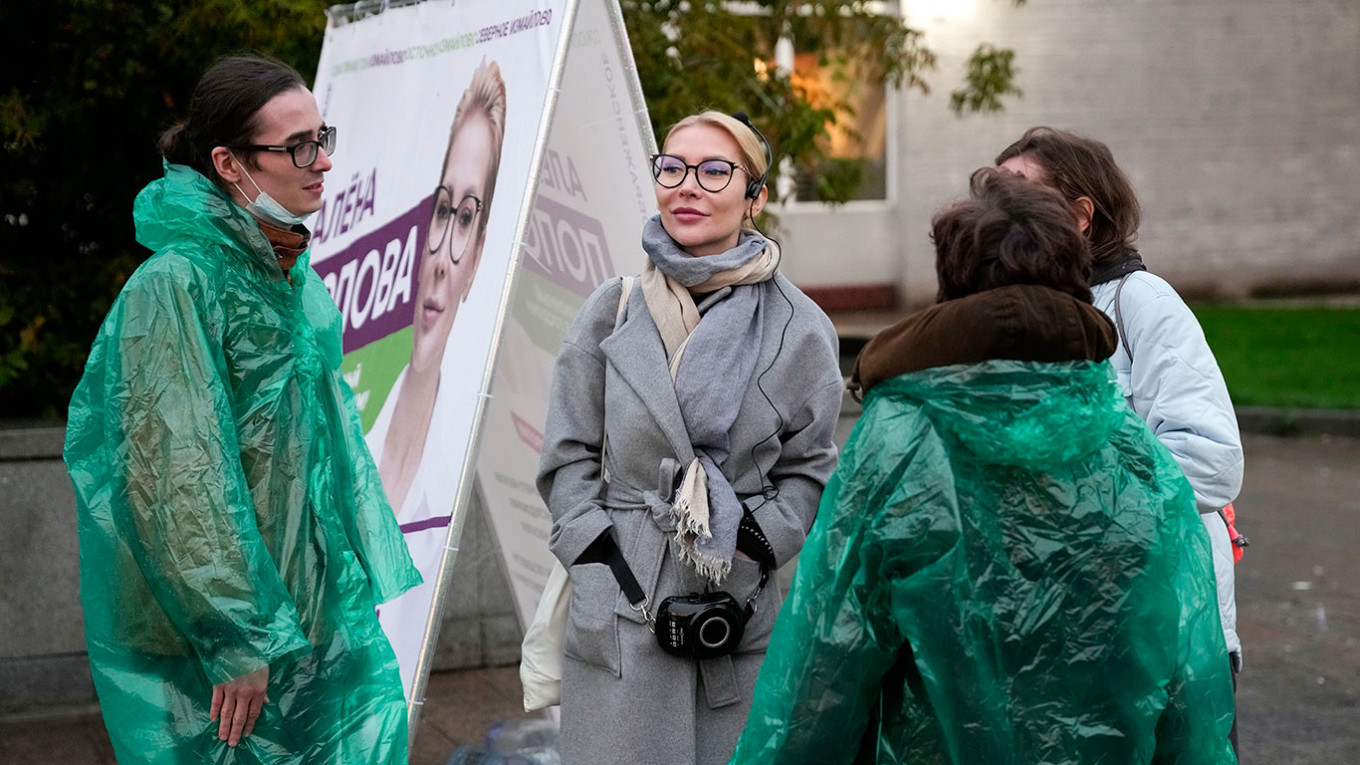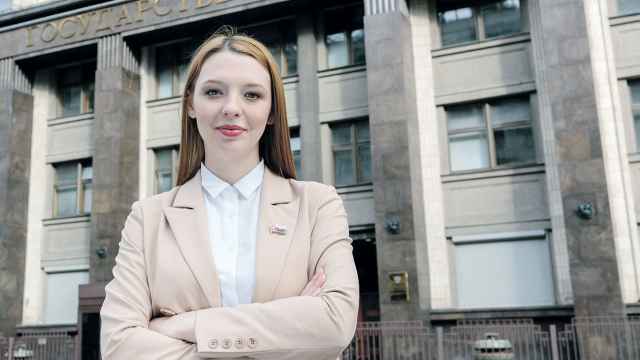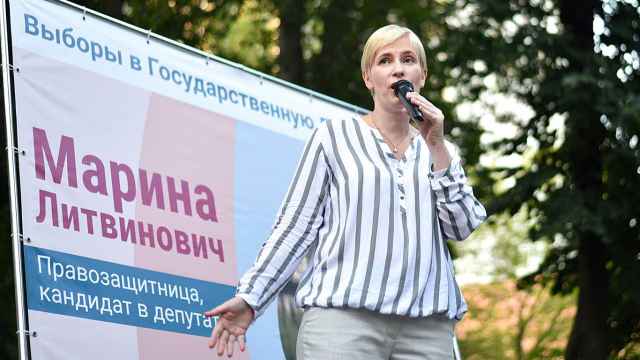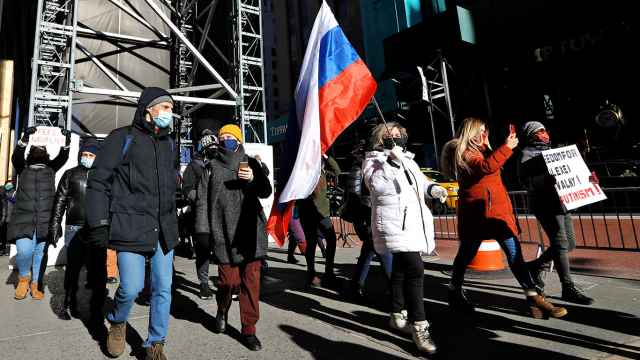Alyona Popova fears that if she is not elected to Russia’s lower house of parliament on Sunday, the passing of a law to protect women from domestic violence will be put on the back burner for another five years.
Popova, 38, a women’s rights activist turned politician, has been working with lawyers and lawmakers on the bill for years in a country that has no law to protect victims of domestic violence, and in 2017 scrapped prison sentences for first-time abusers whose beatings result in “minor harm."
Her opponents running for the State Duma are the ruling United Russia party’s candidate Anatoly Wasserman and the Communist Party’s Sergei Obukhov. On Wednesday, jailed Kremlin critic Alexei Navalny’s Smart Voting scheme, which encourages voters to back the contender most likely to unseat United Russia members, named Obukhov as its chosen candidate.
“The Navalny team's decision to choose Obukhov is a stab in the back that undermines all of our work for the past seven years and it’s coming from our so-called associates, not our enemies,” Popova told The Moscow Times.
Popova sees her candidacy as coming at an increasingly urgent time for Russian women.
Domestic abuse more than doubled after Russia imposed lockdown measures to slow the spread of the coronavirus, the country’s top human rights official said last year. And of the 18,000 women killed in Russia between 2011 and 2019, 65.8% were murdered by their partners or relatives, according to a study published by the Russian Consortium of Women's Non-Governmental Organizations last month.
Funding for NGOs that support domestic violence victims dwindled from 16.5 million rubles in 2019 to 2 million rubles last year, according to the Open Media investigative outlet.
Popova said she was driven to push for legislation to protect victims of domestic violence after the brutal beating of her friend by her common-law husband.
“It is possible and necessary to fight in the State Duma, otherwise this topic will be pushed to the back burner, or the law will be adopted in a version that does not punish criminals and does not protect victims of domestic violence,” she said.
“I swore to my best friend, who was repeatedly beaten by her partner, that I would die for this law,” she added.
Popova started her career as a journalist covering the Duma for the Russian news agency Globus, and later worked as a TV and radio producer before becoming an activist.
She founded the organization Ti Ne Odna (You Are Not Alone) in 2016 to provide victims of violence with free legal, psychological and material assistance.
United Russia Duma deputy Oksana Pushkina — who is also a self-described feminist with pro-LGBT and pro-choice views — told The Moscow Times in an interview that she first saw Popova on TV and immediately recognized a kindred spirit.
“Alyona is a woman of her word with a huge kind heart and incredible ability to work,” Pushkina told The Moscow Times.
Pushkina invited Popova to be part of her “dream team” working to develop the law against domestic violence. Together with lawyers Mari Davtyan and Alexei Parshin and the director of the Nasiliyu.net (No to Violence) NGO Anna Rivina, the group co-authored a bill on the protection of victims of domestic violence.
The proposed law, which Pushkina promoted in the Duma, would aim to prevent violence by reinstating criminal punishment for offenses, promoting the development of crisis centers, providing assistance for victims and creating a system to protect them from persecution.
The proposals have been met with significant resistance.
On Nov. 29, 2019, the Federation Council, Russia’s upper house of parliament, published a draft text of the law, but Pushkina’s team said it differed considerably from their original version.
“The Federation Council’s version of the law is largely toothless,” Popova said.
In March of this year the campaign was dealt another blow when Russia’s Justice Ministry labeled Nasiliyu.net a “foreign agent.” Critics say the designation, which requires labeled organizations to report their activities and face financial audits, seeks to silence dissent and independent media.
Obukhov, Popova’s Communist Party rival, voted in favor of the law when he was a deputy from 2006-2016.
Harassment and indifference
At one of Popova’s campaign meetings in central Moscow on Saturday, Alexandra Nosova, 27, told The Moscow Times she was there because she suffered severe head injuries after her male roommate beat her. She said the police report she filed after the incident largely went ignored.
“I do believe we need a law protecting against domestic and civil violence, for me it’s obvious,” Nosova said.
According to the independent polling by the Levada Center, 79% of Russians believe a law protecting victims against domestic violence is necessary.
Some residents of the area were more skeptical.
“Ah yes, we know Popova, she is very active in our district,” said a woman walking past the meeting with her husband while trying to dodge campaigners handing out leaflets.
When asked if she would vote, the woman replied, “no, but good luck to her.”
At another point, a man approached three of Popova’s female campaign staff and shouted that they should get married and have children instead of “engaging in silly nonsense that’s not going to change anything.”
Throughout her campaign, Popova has faced harassment from Male State, an online hate group that targets women and ethnic minorities. She told The Moscow Times the group has registered her on porn websites, harassed her online, given her phone number to realtors in Moscow and attempted to set her car on fire.
“Male State is a consequence of the patriarchal system in our country, that's why the government does not take action against organizations calling for violence against women,” she said.
Popova added that she has not always been able to count on the support of other opposition members in her fight for domestic violence legislation, saying that letters she wrote to party leaders at the start of her campaign in 2014-2015 were ignored.
“Back then, people avoided the topic altogether. It was a tough, grotesque problem that no one wanted to talk about. So, no one supported me,” she said.
Win or lose, Popova isn’t fazed by the resistance she still faces.
“For me, it’s plain and simple, we are fighting evil.”
A Message from The Moscow Times:
Dear readers,
We are facing unprecedented challenges. Russia's Prosecutor General's Office has designated The Moscow Times as an "undesirable" organization, criminalizing our work and putting our staff at risk of prosecution. This follows our earlier unjust labeling as a "foreign agent."
These actions are direct attempts to silence independent journalism in Russia. The authorities claim our work "discredits the decisions of the Russian leadership." We see things differently: we strive to provide accurate, unbiased reporting on Russia.
We, the journalists of The Moscow Times, refuse to be silenced. But to continue our work, we need your help.
Your support, no matter how small, makes a world of difference. If you can, please support us monthly starting from just $2. It's quick to set up, and every contribution makes a significant impact.
By supporting The Moscow Times, you're defending open, independent journalism in the face of repression. Thank you for standing with us.
Remind me later.







